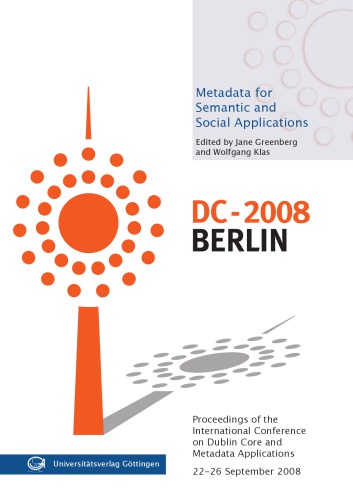

Most ebook files are in PDF format, so you can easily read them using various software such as Foxit Reader or directly on the Google Chrome browser.
Some ebook files are released by publishers in other formats such as .awz, .mobi, .epub, .fb2, etc. You may need to install specific software to read these formats on mobile/PC, such as Calibre.
Please read the tutorial at this link: https://ebookbell.com/faq
We offer FREE conversion to the popular formats you request; however, this may take some time. Therefore, right after payment, please email us, and we will try to provide the service as quickly as possible.
For some exceptional file formats or broken links (if any), please refrain from opening any disputes. Instead, email us first, and we will try to assist within a maximum of 6 hours.
EbookBell Team

4.7
66 reviews
ISBN 13: 9783940344496
Author: Jane Greenberg, Wolfgang Klas
Metadata is a key aspect of our evolving infrastructure for information management, social computing, and scientific collaboration. DC-2008 will focus on metadata challenges, solutions, and innovation in initiatives and activities underlying semantic and social applications. Metadata is part of the fabric of social computing, which includes the use of wikis, blogs, and tagging for collaboration and participation. Metadata also underlies the development of semantic applications, and the Semantic Web — the representation and integration of multimedia knowledge structures on the basis of semantic models. These two trends flow together in applications such as Wikipedia, where authors collectively create structured information that can be extracted and used to enhance access to and use of information sources. Recent discussion has focused on how existing bibliographic standards can be expressed as Semantic Web vocabularies to facilitate the ingration of library and cultural heritage data with other types of data. Harnessing the efforts of content providers and end-users to link, tag, edit, and describe their information in interoperable ways (”participatory metadata”) is a key step towards providing knowledge environments that are scalable, self-correcting, and evolvable. DC-2008 will explore conceptual and practical issues in the development and deployment of semantic and social applications to meet the needs of specific communities of practice.
Metadata is a key aspect of our evolving infrastructure for information management, social computing, and scientific collaboration. DC-2008 will focus on metadata challenges, solutions, and innovation in initiatives and activities underlying semantic and social applications. Metadata is part of the fabric of social computing, which includes the use of wikis, blogs, and tagging for collaboration and participation. Metadata also underlies the development of semantic applications, and the Semantic Web — the representation and integration of multimedia knowledge structures on the basis of semantic models. These two trends flow together in applications such as Wikipedia, where authors collectively create structured information that can be extracted and used to enhance access to and use of information sources. Recent discussion has focused on how existing bibliographic standards can be expressed as Semantic Web vocabularies to facilitate the ingration of library and cultural heritage data with other types of data. Harnessing the efforts of content providers and end-users to link, tag, edit, and describe their information in interoperable ways (”participatory metadata”) is a key step towards providing knowledge environments that are scalable, self-correcting, and evolvable. DC-2008 will explore conceptual and practical issues in the development and deployment of semantic and social applications to meet the needs of specific communities of practice.
semantic application
source metadata
use metadata
metadata ve
w3c metadata
what is metadata for a website
xml metadata example
Tags: Jane Greenberg, Wolfgang Klas, Metadata, semantic